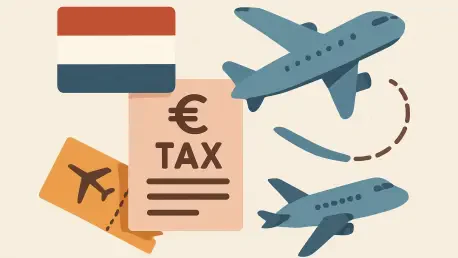What happens when a small tax increase on air tickets threatens to ground an entire industry’s momentum? In the Netherlands, a recent decision to raise air ticket taxes has sent shockwaves through the aviation sector, sparking fierce opposition from airlines, airports, and travelers alike, turning a seemingly minor policy change into a high-stakes battle over economic vitality, environmental responsibility, and the very future of travel. This clash has ignited debates across Europe, raising questions about how governments can balance revenue needs with the urgent push for sustainability without leaving passengers and businesses stranded.
The significance of this controversy extends far beyond Dutch borders. As a key player in global aviation, with hubs like Amsterdam’s Schiphol Airport serving as vital connectors, the Netherlands’ policy choices ripple through international travel networks. This tax hike, framed by some as a step toward greener skies, is criticized for potentially derailing connectivity, affordability, and the industry’s decarbonization goals. At its core, this story reflects a broader European struggle to align fiscal strategies with climate ambitions, making it a critical issue for anyone who flies, works in aviation, or cares about sustainable progress.
Why Is This Tax Sparking Such Fierce Debate?
The Dutch government’s move to increase air ticket taxes has unleashed a storm of criticism, with industry stakeholders arguing it’s a misguided policy at a pivotal time. Aviation leaders contend that the tax, intended to boost state revenue and possibly curb emissions, overlooks the sector’s fragile recovery from recent global challenges. The fear is that higher costs could deter travelers, weaken the Netherlands’ position as a travel hub, and set a dangerous precedent for other nations.
At the heart of the uproar lies a fundamental disagreement over priorities. While policymakers see the tax as a necessary fiscal tool, critics argue it ignores the aviation industry’s broader contributions to jobs, tourism, and economic growth. The tension highlights a deeper question: can environmental goals be pursued without punishing an industry already investing heavily in sustainable solutions? This debate is shaping up to be a defining moment for how aviation policies are crafted across the continent.
The Wider Impact: Why Everyone Should Pay Attention
Beyond the immediate backlash, the air ticket tax hike ties into a larger European trend of using aviation as a revenue source while nodding to environmental concerns. Several countries have adopted similar measures, often justifying them as steps toward net-zero targets. Yet, the Dutch case stands out due to the nation’s outsized role in global travel, with Schiphol Airport handling millions of passengers annually and serving as a gateway to Europe.
This policy affects more than just frequent flyers. Businesses relying on accessible air travel, from multinational corporations to small tourism operators, face potential losses if connectivity suffers. Even those outside the Netherlands should take note, as the precedent could inspire copycat taxes elsewhere, reshaping travel affordability and patterns. Ultimately, the tax reveals a critical fault line in how governments balance short-term financial gains with long-term ecological and economic health.
Unpacking the Consequences: Key Fallout from the Tax Hike
The ripple effects of the tax increase are already becoming evident across multiple fronts. Connectivity, a cornerstone of the Dutch economy, is at serious risk as higher ticket prices may drive passengers to cheaper hubs in neighboring countries like Germany or Belgium. Industry groups such as Airlines for Europe (A4E) and Airports Council International Europe (ACI Europe) warn that this could diminish the Netherlands’ appeal for both business and leisure travel, costing jobs and revenue in the long run.
Passengers, meanwhile, are feeling the direct sting of pricier fares. With no transparent link between the tax and tangible environmental benefits, many travelers question why they’re footing the bill for a policy that seems more punitive than progressive. Families planning vacations and individuals on tight budgets are particularly hard-hit, as affordability takes a backseat to government revenue goals.
Perhaps most concerning is the impact on decarbonization efforts. The aviation industry is under immense pressure to meet the EU’s net-zero target by 2050, requiring massive investments in sustainable aviation fuels and innovative technologies. Critics argue that diverting funds through taxes like this one starves these initiatives of resources, potentially delaying critical progress toward greener skies at a time when action is urgent.
Industry Voices: Outrage and Warnings Ring Loud
Leaders from across the aviation sector have been vocal in their condemnation of the tax hike, pulling no punches in their assessments. Ourania Georgoutsakou of A4E describes it as a lose-lose scenario, stating, “This tax burdens passengers with higher costs while doing nothing for the climate, simply pushing travel elsewhere.” Her words echo a widespread frustration that the policy fails to address root causes of emissions.
Similarly, Olivier Jankovec of ACI Europe has criticized the measure’s shortsightedness, noting, “Airports are economic engines and sustainability partners, yet this tax undermines both roles with no clear benefit.” His perspective underscores a broader industry sentiment that such policies reflect political expediency rather than strategic vision. The consensus among experts is clear: without redirecting revenue to green initiatives, the tax risks being seen as a hollow gesture at best.
Finding a Way Forward: Solutions for a Fair Balance
Amid the criticism, there’s a growing call for collaborative approaches that align government objectives with industry realities. One potential path is to earmark tax revenue specifically for decarbonization projects, such as funding research into sustainable aviation fuels or upgrading airport infrastructure for efficiency. This would ensure that funds directly contribute to environmental goals rather than disappearing into general budgets.
Another idea gaining traction is to shift focus from penalties to incentives. Offering tax breaks or subsidies for airlines and airports that adopt cutting-edge green technologies could drive innovation faster than punitive measures. By fostering dialogue between policymakers and aviation stakeholders, the Netherlands could pioneer a model that other nations follow, proving that economic vitality and sustainability need not be at odds.
Finally, transparency must play a central role in any solution. Travelers and businesses deserve clarity on how tax revenues are used and what measurable impacts they achieve. Building trust through open communication could transform a divisive policy into a shared mission, ensuring that the push for greener aviation doesn’t come at the expense of accessibility or growth.
Reflecting on a Divisive Decision
Looking back, the Dutch government’s choice to hike air ticket taxes stirred a profound debate about the intersection of fiscal policy, environmental stewardship, and economic priorities. The fierce industry backlash underscored deep-seated concerns over connectivity, affordability, and stalled decarbonization efforts. It became a flashpoint in a broader European struggle to harmonize revenue needs with climate ambitions.
As the dust settled, the path ahead demanded innovative thinking. Governments and aviation leaders needed to forge partnerships that prioritized direct investments in sustainable technologies over blunt fiscal tools. Redirecting focus toward incentives and transparent funding mechanisms offered hope for a balanced approach. The challenge remained clear: to craft policies from 2025 onward that supported a net-zero future without sacrificing the vital role of air travel in connecting people and economies.









